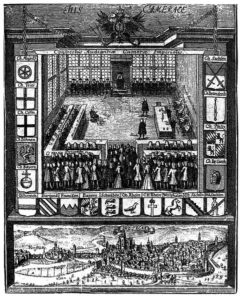Holy Roman Empire Personality Type
Confederation of Central European states (800–1806)
The Holy Roman Empire (Latin: Sacrum Romanum Imperium; German: Heiliges Römisches Reich, pronounced [ˌhaɪ̯lɪɡəs ˌʁøːmɪʃəs ˈʁaɪ̯ç] (listen)) was a political entity in Western, Central and Southern Europe that developed during the Early Middle Ages and continued until its dissolution in 1806 during the Napoleonic Wars.From the accession of Otto I in 962 until the twelfth century, the Empire was the most powerful monarchy in Europe. Andrew Holt characterizes it as "perhaps the most powerful European state of the Middle Age". The functioning of government depended on the harmonic cooperation (dubbed consensual rulership or konsensualer Herrschaft by Schneidmüller) between monarch and vassals but this harmony was disturbed during the Salian period. The empire reached the apex of territorial expansion and power under the House of Hohenstaufen in the mid-thirteenth century, but overextending led to partial collapse.On 25 December 800, Pope Leo III crowned the Frankish king Charlemagne as emperor, reviving the title in Western Europe, more than three centuries after the fall of the earlier ancient Western Roman Empire in 476. In theory and diplomacy, the emperors were considered primus inter pares, regarded as first among equals among other Catholic monarchs across Europe. The title continued in the Carolingian family until 888 and from 896 to 899, after which it was contested by the rulers of Italy in a series of civil wars until the death of the last Italian claimant, Berengar I, in 924. The title was revived again in 962 when Otto I, King of Germany, was crowned emperor by Pope John XII, fashioning himself as the successor of Charlemagne and beginning a continuous existence of the empire for over eight centuries. Some historians refer to the coronation of Charlemagne as the origin of the empire, while others prefer the coronation of Otto I as its beginning. Henry the Fowler, the founder of the medieval German state (ruled 919 – 936), has sometimes been considered the founder of the Empire as well. The modern view favours Otto as the true founder. Scholars generally concur in relating an evolution of the institutions and principles constituting the empire, describing a gradual assumption of the imperial title and role.The exact term "Holy Roman Empire" was not used until the 13th century, but the Emperor's legitimacy always rested on the concept of translatio imperii, that he held supreme power inherited from the ancient emperors of Rome. The imperial office was traditionally elective through the mostly German prince-electors.

